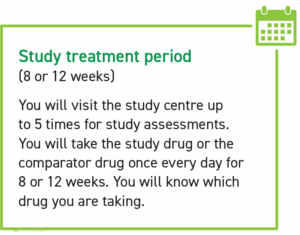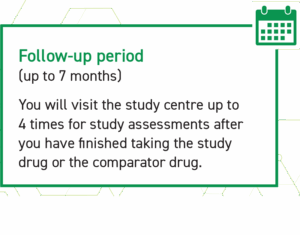Join a Hepatitis C Virus (HCV) Infection Study
Join our research study for a new investigational treatment at no cost.
Benefits of Joining this Clinical Trial
You will be paid $100 for each completed visit.
Study related medication and care provided at no cost
Health insurance is not required

A clinical trial is a carefully designed research study involving human volunteers to investigate the safety and effectiveness of a new drug or treatment. Clinical trials are essential for evaluating the benefits and risks of medical interventions, ultimately informing healthcare decisions and regulatory approvals.
As a clinical trial or observational study participant, your responsibilities and what you will be required to do can vary depending on the study, its objectives, and the phase of the trial.
Some common activities and responsibilities you may encounter as a participant include: diagnostic tests, treatments, procedures, doctor visits, dietary changes, exercise and/or other lifestyle changes. Observational studies often involve minimal effort, such as completing questionnaires, sharing test results, maintaining a diet or exercise log.
Joining a clinical trial can provide access to cutting-edge treatments, close medical monitoring, and an opportunity to contribute to medical knowledge. Participants may experience improved health outcomes and specialized care while potentially receiving compensation for volunteering.
Clinical trials are designed with a strong emphasis on the safety of participants, and multiple safeguards are in place to minimize risks, including careful study design, oversight by institutional review boards and routine monitoring of study data by independent experts. Researchers must inform participants of the risks, benefits and/or side effects they discover.
Yes, you can drop out of a clinical trial study at any time, and you have the right to do so without facing any penalties or consequences. This is often referred to as "withdrawal of consent."
Voluntary participation is a fundamental principle of clinical research. You are not obligated to continue in a trial if you no longer wish to do so.
Determining your eligibility to participate in a clinical trial involves a thorough evaluation of specific eligibility criteria set forth by the study's researchers and sponsors. The criteria help define the patient population being studied and are designed to protect the safety of participants in the trial.
Providing accurate information about your medical history and health status is crucial for your safety and the integrity of the research. If you are not eligible for one trial, you may still be eligible for other trials in the future, so it's worth exploring your options if you are interested in participating in clinical research.
ABOUT THE C-BEYOND STUDY
The C-BEYOND Study is comparing the safety and effectiveness of an investigational drug (study drug) with another drug (comparator drug). The comparator drug is a generic version of a drug approved in the United States and Canada to treat HCV, but this generic version being used in the study has only been approved in the United States. The study drug is investigational, and it is not approved for the treatment of HCV infection.
Up to 830 people will take part in this study.
What will happen in the study?
While current HCV treatments work, they may not be suitable for all patients with HCV.
If you take part, you will be in the C-BEYOND Study for about 9.5 months.
You will need to:
- Visit the study center up to 10 times for tests and assessments, and
- Take the study drug or comparator drug by mouth every day for 8 or 12 weeks.
Who can take part?
You, or someone you care for, may be able to take part if you/they:
- Are 18 to 85 years of age
- Have chronic HCV infection, and
- Do not have a hepatitis B virus (HBV) infection
Other criteria apply.

What Else Do I Need to Consider?
- The study team will explain the possible benefits and risks of the study.
- You do not have to take part in the study if you do not want to.
- If you choose to take part in the study, you can stop participating at any time.
- You will not be paid to take part in this study, but you may be reimbursed for reasonable travel costs during your participation.
- All study drugs and study-related tests will be provided at no cost to you.
- A team of doctors and nurses will monitor your health carefully during the study.
- An Institutional Review Board (IRB)/Ethics Committee (EC) has reviewed this study.
- An IRB/EC protects the rights, safety, and well-being of participants.





